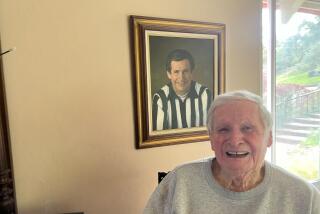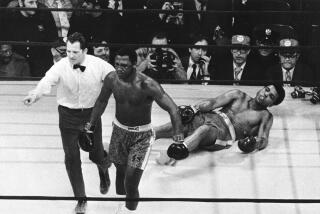Tunney’s Son Backs New Champ, Decries Boxing
- Share via
SANTA ROSA, Calif. — Gene Tunney Jr., whose father retained the heavyweight title with what still ranks as boxing’s most famous “long count” victory, says James (Buster) Douglas fully deserves his newly won crown.
But Tunney, the district attorney of Sonoma County, also believes it is time to ban boxing.
“It’s a sport whose day has come and gone,” he said Tuesday in an interview with the Santa Rosa Press Democrat. “I don’t think it should be sanctioned anymore.”
He added, “The name of the game is to hurt your opponents, as much and as quickly as you can. My father did it in his era, but it was a different time. Now we know every time you get struck with a hard blow to the head, you will have brain damage, or run the risk.”
In the 1920s, when Gene Tunney reigned as champion, “they didn’t understand the mechanics of the brain bouncing off the inside of the skull and hemorrhaging,” his son said.
When asked why he was just now declaring his opposition to boxing, Gene Tunney Jr. replied, “No one ever asked before.”
Douglas took the heavyweight title from Mike Tyson last weekend with a knockout in a fight featuring a “long count” reminiscent of the one in the 1927 bout between Gene Tunney and Jack Dempsey.
Gene Tunney Jr. said that although he considers boxing “dismal” as a sport, he will try to watch the HBO rerun of the Douglas-Tyson fight Friday night.
“It piques my interest,” he admitted.
He added that, from what he’s read, Douglas “absolutely” deserves his title, as boxing’s governing bodies have ruled, despite being on the canvas for 12 seconds--two seconds too long--because of a referee’s mistake after an eighth-round knockdown.
“It wasn’t blamed on the fighters,” Tunney said. “They were doing exactly what they were supposed to do, following the direction of the referee.
“It doesn’t mean Douglas shouldn’t win the fight. The fact was Douglas could get up. Tyson couldn’t finish him off, and Douglas turned around and knocked Tyson out.”
In 1927, Tunney said, a new knockdown rule required the standing fighter to go to the farthest neutral corner before the count could start.
“Both parties were clearly instructed in three fight negotiations,” regarding the new rule, Tunney said. Before that “Dempsey had the longstanding practice of standing over his opponents and clubbing them in the back of the head when they tried to get up again. It was not illegal.”
After six rounds, Dempsey, seeking to regain the title he lost to Tunney a year earlier, toppled his opponent with a barrage of punches but went to the wrong corner, using up five seconds before he moved to the correct corner.
Fourteen seconds later, Tunney got up. He went on to win a unanimous decision for the 10-round fight after knocking Dempsey down.
The district attorney said Dempsey explained he simply forgot about the new rule.
“He was so excited when he knocked father down,” Tunney said.
More to Read
Go beyond the scoreboard
Get the latest on L.A.'s teams in the daily Sports Report newsletter.
You may occasionally receive promotional content from the Los Angeles Times.










